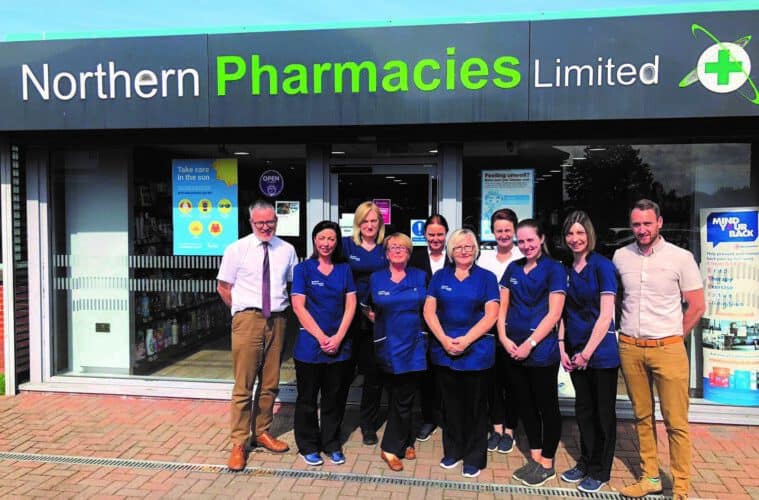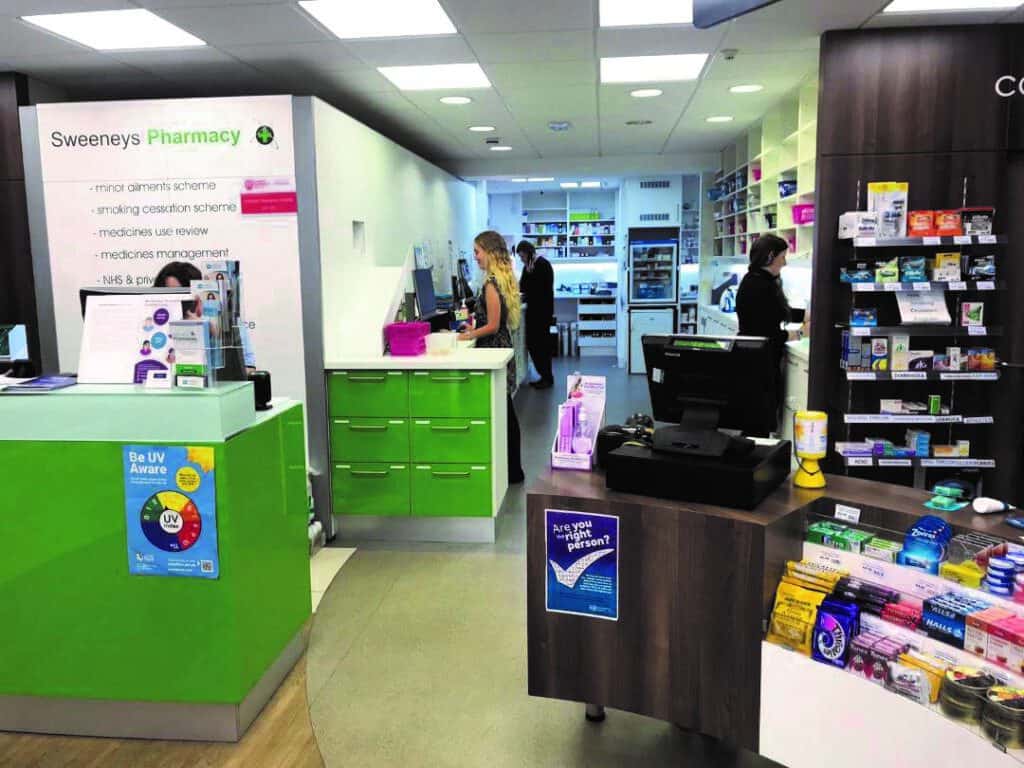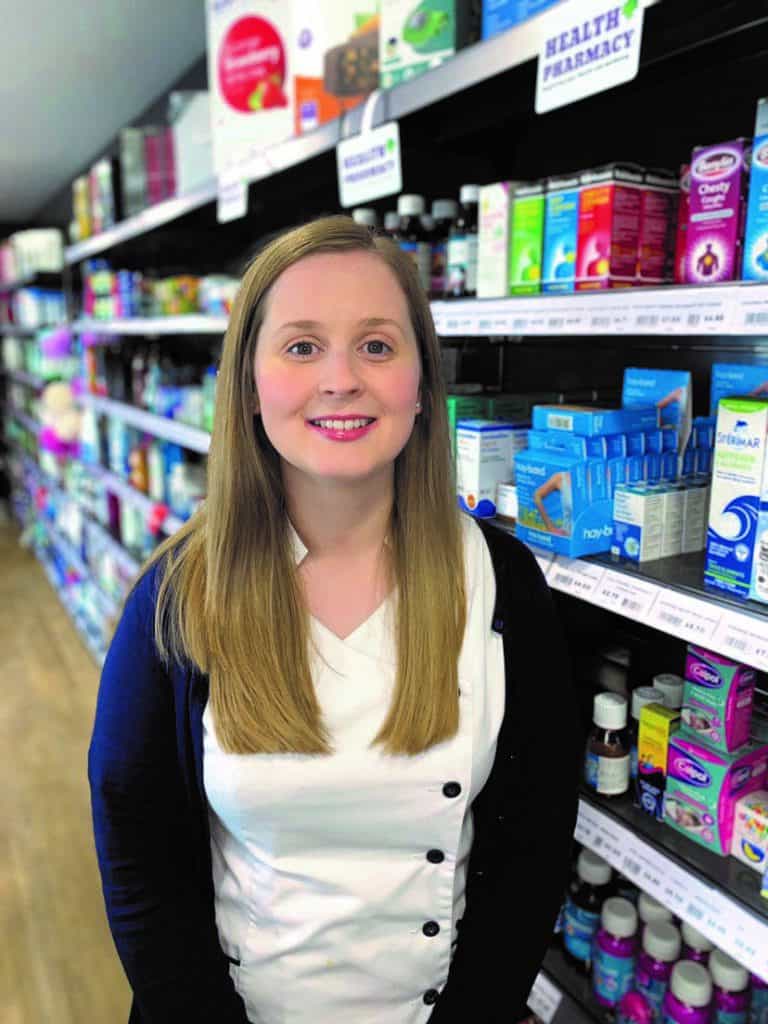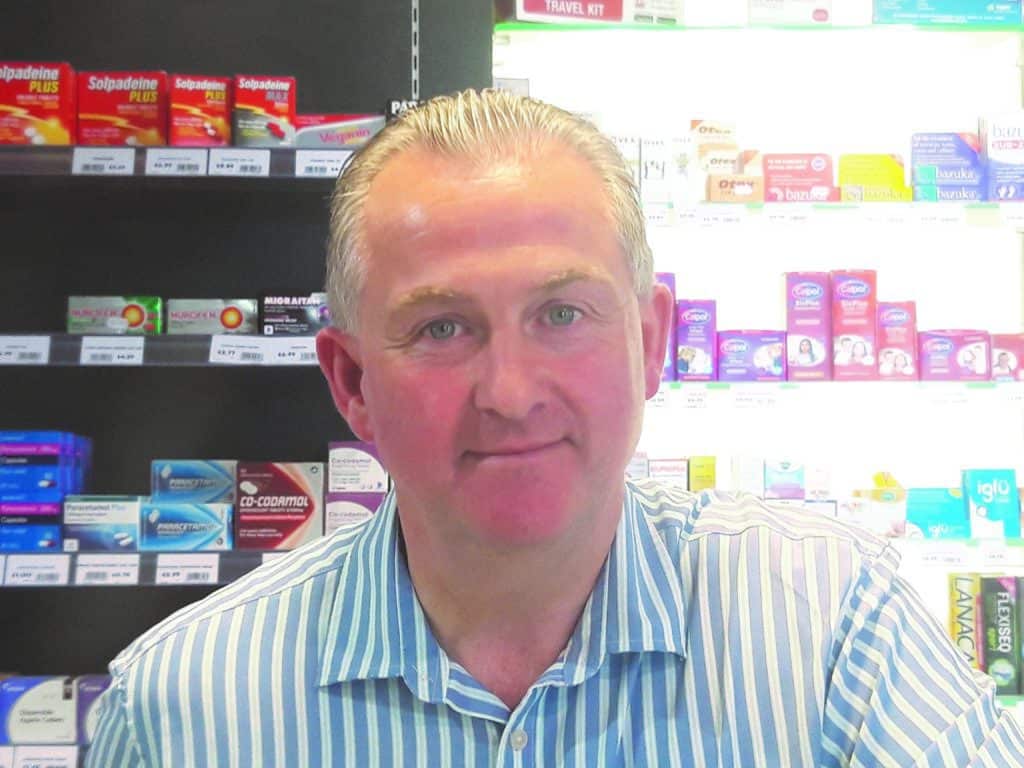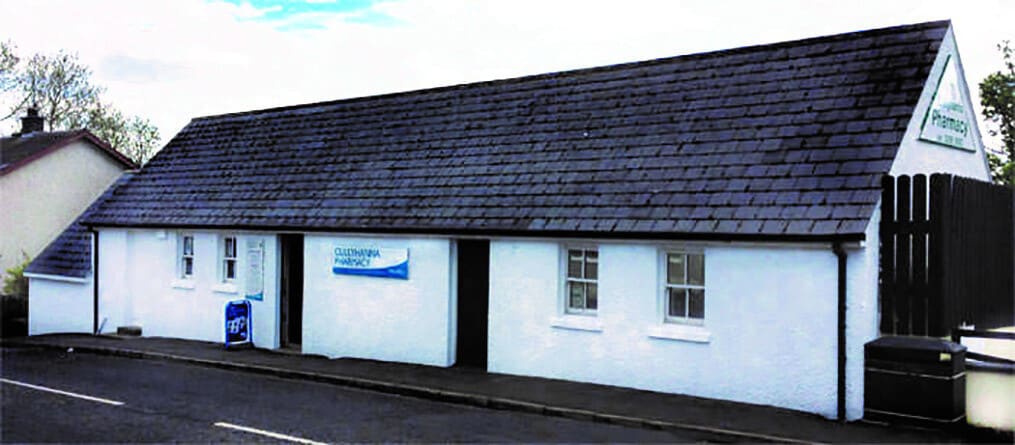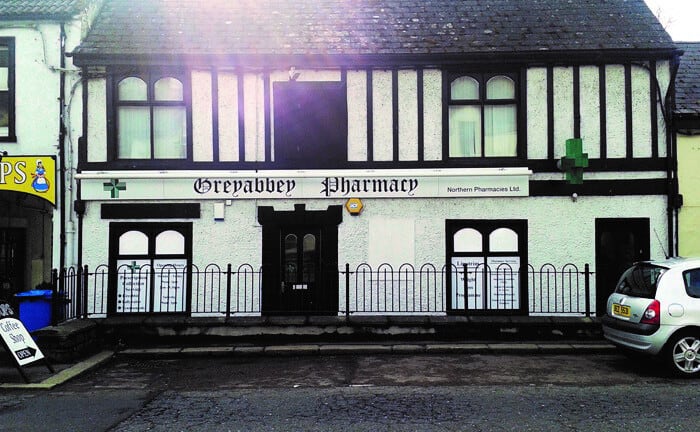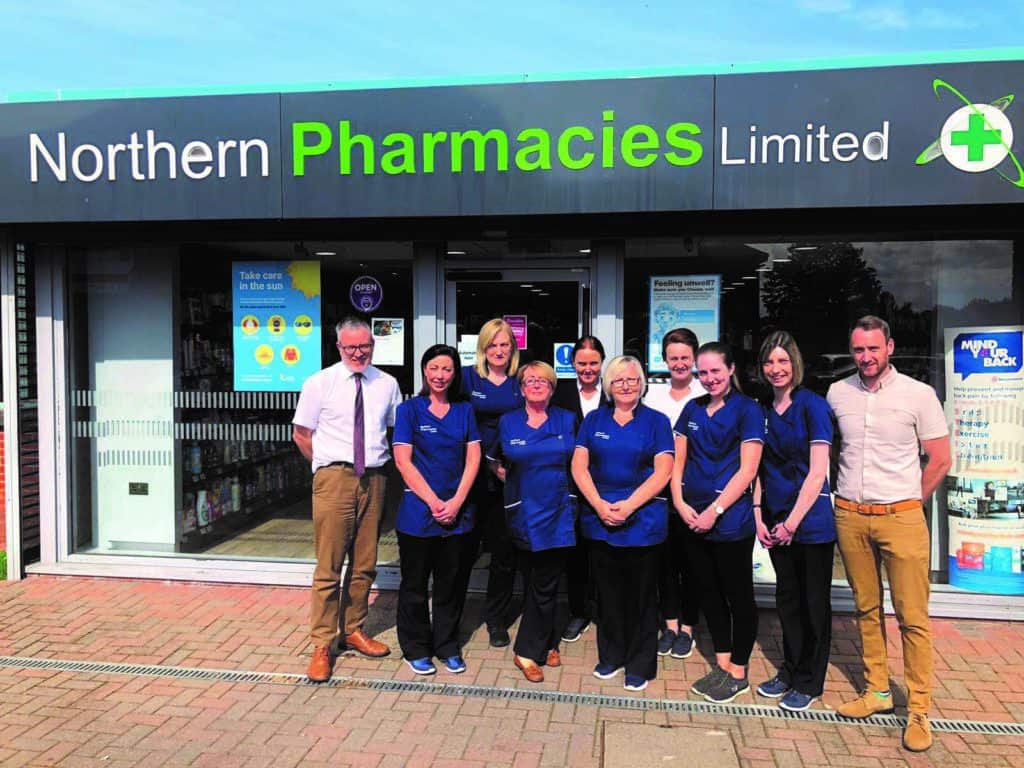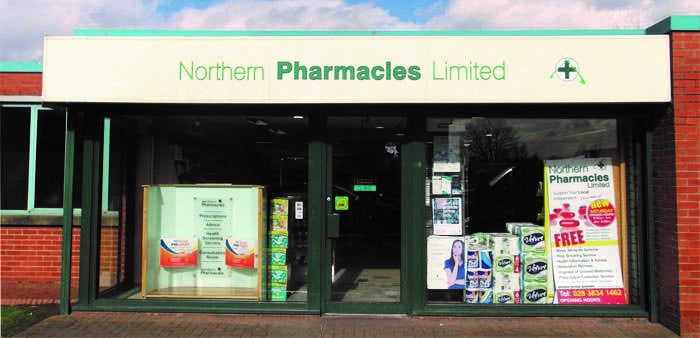Northern Pharmacies hits its half century!
From an inauspicious start in a portacabin in Craigavon in 1969, Northern Pharmacies Ltd (NPL) has grown organically over the last 50 years and now has five pharmacies under its umbrella.
‘The growth of the company was an organic process,’ says NPL Managing Director and Superintendent, Michael Hamill, ‘which began when a health centre was being built in the new town of Craigavon. Due to the uncertainty over the new town, however, no pharmacist was prepared to take the risk of setting up a pharmacy and so, as a result, some forward-thinking pharmacists set up a pharmacy company limited by guarantee to meet the needs of both the GP practice and the small population.’
The company was incorporated on 3 March 1969 and the handwritten minutes of the first Board meeting feature names such as Herbert Gamble, Joshua Kerr, John Joseph Farelly, John Knox, Brian Hatley, Thomas O’Rourke and William Gorman: illustrious gentlemen, who were all associated with the Pharmaceutical Society of Northern Ireland and clearly held the profession and what the community pharmacists had to offer in high regard. They believed in themselves, were ambitious for their profession and prepared to think outside the box.
Over the years, other pharmacists, such as Derek Corbett, Derek Lawson, William Woodside and Ken McGregor also made huge contributions.
NPL now owns five pharmacies in Northern Ireland and these are located at Brownlow Health Centre, Craigavon; Greyabbey; Poyntzpass; Cullyhanna and Holywood.
The Craigavon pharmacy is the largest of the five and handles a heavy workload, with a highly experienced team led by Martin McVeigh. Martin joined NPL in 1995 as a pre-reg and has never left! Martin is proud of the pharmacy’s reputation for staff retention.
‘Over the last 24 years, I’m delighted to say that we have always had a high level of staff retention,’ Martin told PiF. ‘Briege Lavery, for example, joined the team eight years before I arrived and has now been here for an amazing 32 years, while Violet Howie has worked here for 30 years. Their service is highly valued by the Board of NPL and it is gratifying to hear them talk about how much they enjoy both their work and the company of the other staff. Both of these ladies worked with Jim Spiers, the first Superintendent of NPL, for a number of years and they have fond memories of how he used to pick them up in the morning and leave them home for their lunch! It’s actually more common to retire from NPL than to leave for other employment.’
Over the years, Martin has seen major changes at Brownlow, as the pharmacy has been transformed into a clinical ‘hub’ for healthcare services.
‘When I started here,’ he continues, ‘there was one computer, no automatic ordering and only one patient on instalment dispensing. It was also common at that time to make up cough bottles and teething mixtures. Now we have two consultation rooms, a dispensing robot and multiple computers. It’s a completely different healthcare landscape and, as with most of NPL pharmacies, we actively deliver on all pharmacy services, such as smoking cessation and MURs and dispensing of methadone and subutex. There’s no doubt that the installation of the dispensing robot six years ago has been a vital element in managing the workload efficiently and safely, but I still insist that the team is vital to all of the services that we deliver. Staff retention and continuity is the key to our excellent patient-centred service. That’s what makes us special!’
In Greyabbey, meanwhile, the pharmacy, which was acquired by NPL in 1986, is managed by Heather Dynes, who also joined the company in October of the same year. Heather has fond memories of the last 33 years.
‘I still remember when the pharmacy was located in an old paint shop and still had tweed wallpaper,’ she says. ‘Then, when the shop was refitted in 1990, the dispensing continued from a spruced-up cattle trailer to ensure that we continued to deliver services to our community!’
Heather’s colleague, Jacqui McDowell, is also a long-standing employee, with an impressive fifteen years’ service under her belt. Both are aware of their role as an essential part of a small community and that ultimately is where they get their job satisfaction and why they have stayed with NPL all of these years.
‘As the most accessible patient-facing healthcare service,’ Heather continues, ‘we believe that it is vitally important for our customers to know us and, more importantly, for us to know them by name. With so many years’ experience between us, we have seen second and sometimes third generations growing up and we feel that we have grown with our patients. They know that we are always here for a friendly chat or helpful advice and often feel more comfortable speaking to us in the pharmacy setting rather than in a more formal healthcare setting.’
Another of NPL’s long-standing employees is Dermot McCusker, pharmacy manager in Poyntzpass Pharmacy. NPL took over the pharmacy in 1993 following the sudden death of the previous pharmacist. Dermot has been with the company for 26 years and is perhaps unique in the NPL workforce in that, in addition to the delivery of standard pharmacy services, his expertise in – and experience of – veterinary medicines has been a valuable contribution to the local farming community.
‘Poyntzpass may be a small village,’ Dermot tells PiF, ‘but there is a large rural hinterland. For that reason, a large part of our counter business is animal treatment products, such as pet wormers, insecticide and wormers. Our OTC in this sector is an important part of the business, but we also provide a major service to the local community since the pharmacy is based about four miles from the main GP surgeries so, for that reason, our collection and delivery service, which covers everywhere from Loughbrickland to Banbridge, is vitally important for our patients.’
Twenty miles south of Poyntzpass lies the small village of Cullyhanna. The townland’s pharmacy was opened by NPL in response to a request from the local community and has, over the years, demonstrated the value that a pharmacy can provide to an isolated rural community.
Pharmacist Emer Geoghegan has worked closely with the community on many Building Community Pharmacy Partnership projects and believes that the pharmacy provides much more to the local population than simply standard pharmacy services.
‘A few years ago, I had participated in a project, which facilitated a women’s group aged 55 years plus and I had been made very aware of how much this initiative had provided for the women in terms of practical and emotional support. I therefore decided to turn my attention to men aged between 30 and 55, particularly those who had been quite active in their younger years, but who had now stopped all physical activity and had become more sedentary – mainly because of a lack of opportunities due to age and work/life balance. In partnership with the Rural Health Partnership, I secured funding from Building Community Pharmacy Partnership to run a project for men in the local area in a bid to tackle the health issues that may have been affecting them, but about which they were reluctant to speak.’ >
Ever keen to continue the pharmacy’s involvement in the local community, Emer has now switched her attention to providing support and information to women in the local area, who are going through the menopause! A terrific example of what community pharmacy can offer its patients.
Sweeney’s Pharmacy in Holywood is also providing a superb additional service to the local community. Pharmacist David Marshall spends two days a week working in the pharmacy and the other three based at the Marie Curie Hospice in East Belfast, providing an invaluable link at the interface with the hospice team, hospital and community pharmacists.
‘Our palliative care service provides an invaluable reference point for many local GPs,’ says pharmacy manager, Clare Hunter. ‘They know that the pharmacy dispenses a lot of prescriptions from patients, who are palliative, and so they are reassured with regard to product availability. Ideally, we want David’s post – and the pharmacy – to become a resource for all pharmacists involved in palliative care.’
Sweeney’s also recently began offering an innovative travel and vaccination clinic in store and, since this is the only pharmacy in the area offering this service, it has proved to be very successful.
‘In today’s community pharmacy,’ Clare continues, ‘it’s vitally important that we are seen as a destination which can provide as many of the healthcare services our patients require. They know and trust us – indeed, one of our assistants, Elizabeth Laing will be celebrating 50 years’ service next year! – and, as such, we have an important role to play in the local community.’
With five pharmacies now in its stable, the NPL Board decided a few years ago to develop a new and comprehensive strategy for the business.
‘Rather than a purely commercial business,’ says Michael Hamill, ‘NPL is a mutual type organisation created for the benefit of the pharmacy profession, with a focus on the community pharmacy network. A testament to this is our recent winter cough and cold service. This allowed patients registered in GP surgeries local to our pharmacies to have a point of care consultation and test (if required) in order to try and reduce antibiotic prescribing in Strep throat and upper respiratory infections. It was hugely successful from a patient perspective, assisted GPs during peak season and empowered our pharmacists. The project is in the process of being evaluated by MOIC and the early signs are very encouraging. This was a considerable investment by NPL, both financially and in terms of staff time. I was delighted with the response from the pharmacy teams who were fully engaged in the project.
‘In 2016, the NPL Board addressed the question of where the company would like to get to in the future. Clearly the operation of a successful and sustainable business model was a core objective, but more challenging was the idea of seeing how resources produced by the business activities could be applied to the wider objects of the company.
‘As a result, the Board created a vision statement which focussed primarily on how to have a financially secure, robust and sustainable business model sufficient to sustainably fund innovative and developmental activities designed to deliver, in the community pharmacy network, a fully-integrated professional service, incorporating a medical and a societal model of health, where the pharmacist, in conjunction with the patient, is responsible for the provision of cost-effective drug therapy for the purpose of achieving definite outcomes, incorporating positive behavioural change, that improves a patient’s quality of life.
‘This vision sees pharmaceutical services provided from the community pharmacy network as being offered by a fully autonomous pharmacist acting in an integrated way with other health and social care professionals, but fully responsible for the choice and outcomes from medicines used by patients in the management of chronic and acute conditions. In addition, the pharmacy will become a community asset in supporting improved community public health. Going forward, NPL, through its business activities, will create resources and apply these towards the achievement of its vision. We recognised, of course, that new skills would be required and so I completed an MBA at the Ulster Business School, which was a fantastic experience. It has opened up ideas and new ways of thinking that you just don’t experience in a pharmacy degree.
‘I cannot speak highly enough of the staff across the company. The environment is extremely challenging and has been for some time however I know that the company is in a strong place to embrace the challenges that lie ahead and that is very much down to the commitment, loyalty and skillset of our staff.
‘NPL has been delivering pharmacy services for fifty years and has seen enormous change in that time. We want to work with all professions, organisations and individuals to develop and test community pharmacy services to improve the health and well-being of the population. Fifty years is a significant milestone in any sector, however there is nothing to be achieved from looking back because the way forward is very different. Community pharmacists are skilled, competent and capable of extending our role to assist in breaking down the silos that still exist in healthcare. There needs to be a recognition and investment in that by the commissioners that will ultimately improve patient outcomes and drive efficiency in point of care treatment. I feel strongly that NPL is in a strong position to meet the current and future demands of a holistic community pharmacy service.’



